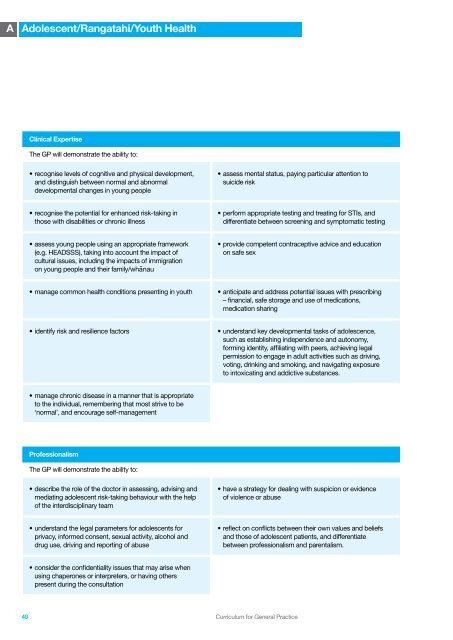Curriculum for General Practice - The Royal New Zealand College ...
Curriculum for General Practice - The Royal New Zealand College ...
Curriculum for General Practice - The Royal New Zealand College ...
Create successful ePaper yourself
Turn your PDF publications into a flip-book with our unique Google optimized e-Paper software.
A Adolescent/Rangatahi/Youth Health<br />
Clinical Expertise<br />
<strong>The</strong> GP will demonstrate the ability to:<br />
• recognise levels of cognitive and physical development,<br />
and distinguish between normal and abnormal<br />
developmental changes in young people<br />
• assess mental status, paying particular attention to<br />
suicide risk<br />
• recognise the potential <strong>for</strong> enhanced risk-taking in<br />
those with disabilities or chronic illness<br />
• per<strong>for</strong>m appropriate testing and treating <strong>for</strong> STIs, and<br />
differentiate between screening and symptomatic testing<br />
• assess young people using an appropriate framework<br />
(e.g. HEADSSS), taking into account the impact of<br />
cultural issues, including the impacts of immigration<br />
on young people and their family/whānau<br />
• provide competent contraceptive advice and education<br />
on safe sex<br />
• manage common health conditions presenting in youth<br />
• anticipate and address potential issues with prescribing<br />
– financial, safe storage and use of medications,<br />
medication sharing<br />
• identify risk and resilience factors<br />
• understand key developmental tasks of adolescence,<br />
such as establishing independence and autonomy,<br />
<strong>for</strong>ming identity, affiliating with peers, achieving legal<br />
permission to engage in adult activities such as driving,<br />
voting, drinking and smoking, and navigating exposure<br />
to intoxicating and addictive substances.<br />
• manage chronic disease in a manner that is appropriate<br />
to the individual, remembering that most strive to be<br />
‘normal’, and encourage self-management<br />
Professionalism<br />
<strong>The</strong> GP will demonstrate the ability to:<br />
• describe the role of the doctor in assessing, advising and<br />
mediating adolescent risk-taking behaviour with the help<br />
of the interdisciplinary team<br />
• have a strategy <strong>for</strong> dealing with suspicion or evidence<br />
of violence or abuse<br />
• understand the legal parameters <strong>for</strong> adolescents <strong>for</strong><br />
privacy, in<strong>for</strong>med consent, sexual activity, alcohol and<br />
drug use, driving and reporting of abuse<br />
• reflect on conflicts between their own values and beliefs<br />
and those of adolescent patients, and differentiate<br />
between professionalism and parentalism.<br />
• consider the confidentiality issues that may arise when<br />
using chaperones or interpreters, or having others<br />
present during the consultation<br />
40<br />
<strong>Curriculum</strong> <strong>for</strong> <strong>General</strong> <strong>Practice</strong>

















